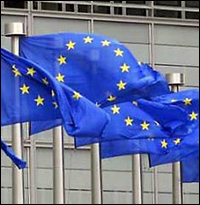The European Union may approve fresh sanctions against Iran within weeks, after a UN agency said Tehran had worked to design nuclear bombs, EU diplomats said on Thursday, Today's Zaman reported.
Iran denies trying to build atom bombs and its Supreme Leader Ayatollah Ali Khamenei said any US or Israeli attack on its nuclear sites would be met with "iron fists".
The United States and Israel have refused to rule out any option to prevent Iran from acquiring a nuclear arsenal.
Diplomats in Brussels said preliminary discussions among EU capitals on new measures had begun and plans may be ready for EU foreign ministers in Brussels to approve on Dec. 1.
"Experts are discussing a number of options on the table but it is difficult to foresee the outcome of the debate," one EU diplomat said. Another said he expected a formal decision to be reached on Dec. 1.
EU sanctions would be a significant part of Western efforts to ratchet up pressure on Tehran after the UN nuclear watchdog's report this week that laid bare a trove of intelligence suggesting Iran is seeking nuclear weapons.
Western governments would prefer UN Security Council measures against Tehran. But Russia and China, both permanent UN Security Council members with veto power, are opposed.
Diplomats from both countries met in Moscow on Thursday and expressed "the mutual conviction that the application of new, additional sanctions against Iran will not lead to the desired result," Russia's foreign ministry said in a statement.
In a possible sign of growing concern that the nuclear standoff might provoke Israel to attack Iran's atomic facilities, UN Secretary-General Ban Ki-moon called for a diplomatic solution.
"The secretary-general reiterates his belief that a negotiated rather than a military solution is the only way to resolve this issue," UN spokesman Martin Nesirky told reporters.
Tehran, which says its nuclear programme is for producing electricity and other peaceful purposes, said on Wednesday it remains ready for negotiations with world powers on the issue.
Western diplomats say only sanctions against Iran's energy sector could exert serious pressure on Tehran, but such steps would also hurt a global economy hit by Europe's debt crisis.
Some EU governments are wary of inflicting economic pain on the Iranian people or of closing potential communication channels by targeting Iranian officials. Others fret about the damage oil sanctions could do to their own economic interests.
Germany, Britain and France, along with the United States, Russia and China, form a group of powers negotiating with Iran. The last round of talks stalled at the start of this year.
Iran already faces a wide range of UN sanctions, as well as some imposed unilaterally by the United States and the EU.
Tension over Iran's nuclear programme has increased since Tuesday when the International Atomic Energy Agency (IAEA) reported that Tehran appeared to have worked on designing a bomb and may still be conducting secret research to that end.
Media speculation about possible US or Israeli military action has also intensified since the IAEA report, denounced by Iran as "unbalanced" and "politically motivated".
Khamenei said Iran would retaliate against any attack by its foes, but had no intention of starting a "bloody war".
"Our enemies, particularly the Zionist regime (Israel), America and its allies, should know that any kind of threat and attack or even thinking about any (military) action will be firmly responded to," Khamenei said on state television.
"The Revolutionary Guards and army and our nation ... will answer attacks with strong slaps and iron fists," he added.
Israel reacted to the report by urging the international community to stop Iran from getting nuclear weapons, saying Tehran's pursuit of such arms endangered "the peace of the world".
A close strategic ally of Western powers, Israel is widely believed to have the Middle East region's only nuclear arsenal, dating back decades. It has never confirmed or denied this, under a policy of ambiguity designed to deter attacks.
Israel bombed Iraq's Osirak atomic reactor in 1981 and carried out a similar strike in Syria in 2007.
International diplomatic pressure and sanctions have yet to induce Iran to halt sensitive nuclear activities.
Iran's announcement last year that it had escalated uranium enrichment from the low level needed for electricity production to 20 percent, alarmed many countries that feared it was a key step towards making material potent enough for a nuclear bomb.
Tehran says it needs the fuel to make isotopes for cancer treatment.
A leading Israeli investment firm said on Thursday any military strike on Iranian nuclear facilities would exact an economic price too high for the world to accept.
A oil price surge, the costs of war and damage to global trade would be too great and would deter world powers from serious action, said Amir Kahanovich, chief economist at Clal Finance, one of Israel's largest brokerage houses.






